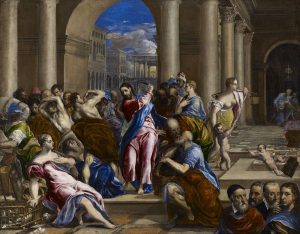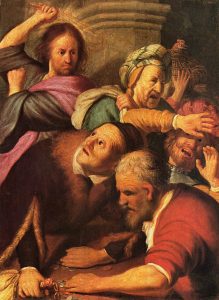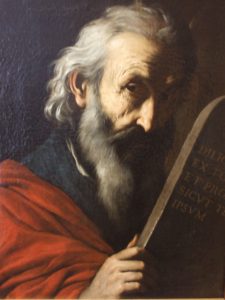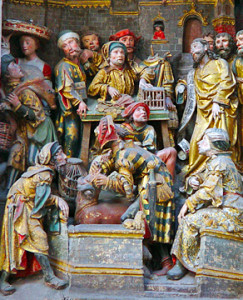em>Thoughts on Sunday’s Lessons for March 3, 2024 (Lent 3B)

Christ driving the money-changers from the Temple (c.1570), oil painting on canvas by El Greco (1541-1614). Minneapolis Institute of Art. (Click image to enlarge.)
First Reading: Exodus 20:1-17
So far in Lent we have heard the ancient stories of God’s covenantal promises to Noah and Abraham. Now we come to the great covenant with Moses and the people in the desert at Mount Sinai. God promises that the people will become a holy nation, that they will live and prosper in the promised land. In return, the people agree to walk in God’s way, making a covenant that they will live in accord with God’s commandments. Now they hear those commandments uttered for the first time, echoing over the throng as God’s thunderous voice shakes the mountain. These ten simple principles sum up the way in which the people shall live, detailing how they are to love God and love each other.
Psalm: Psalm 19
“The heavens declare the glory of God.” This familiar hymn of praise and thanksgiving sings in exultation at the beauty and wonder of all God’s creation. In beautiful poetic language it shouts with joy about God’s gift to all the people of the world and to all the span of the universe. And within that creation, the hymn rings on, God’s laws and statutes – the great commandments – give us wisdom and joy and lead us to righteousness.
Second Reading: 1 Corinthians 1:18-25
Paul’s first letter to the people of Corinth in northern Greece is listed among his greatest epistles. Throughout its 16 chapters we see him offering loving pastoral advice to a distant community that has been splitting into factions over a variety of issues. In this passage taken from near the beginning, Paul clearly expresses the overarching theme of this letter: The Cross unites us as one! We may appear foolish to both Jews and Gentiles for worshiping as God a man executed on the brutal Roman cross, a symbol of pain, shame and degradation. But their opinion doesn’t matter, Paul writes,because we prefer God’s “foolishness” to mere human wisdom. We celebrate God’s weakness over the limited power that humans consider strength.
Gospel: John 2:13-22
For the remaining Sundays of Lent we turn from Mark to John’s Gospel, beginning with the familiar story of Jesus throwing the money-changers out of the Temple. This narrative appears in all four Gospels, but curiously, while Matthew, Mark and Luke all place it at the beginning of Holy Week, in John we find it near the beginning of the Gospel, during an earlier trip to Jerusalem for Passover that none of the others mention. Moreover, John alone tells of Jesus not merely throwing over the money changers’ tables but fashioning a whip of cords to lash them in his anger at their exploiting the poor in the name of God. Then Jesus foreshadows his own passion and death, likening his own body to the Temple and declaring that he will “rise up” three days after his body’s destruction.



